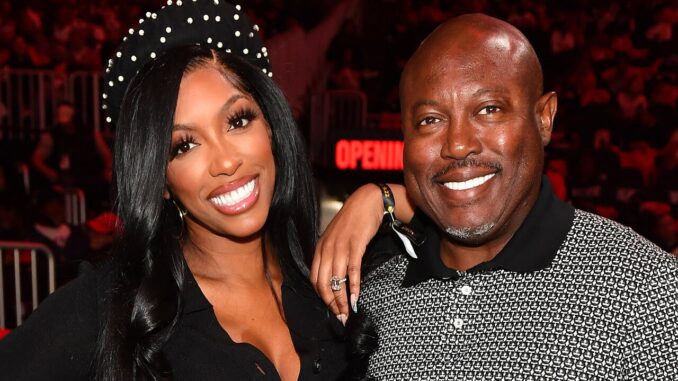
The grand stage of reality television, particularly the "Real Housewives" franchise, has long been a glittering proscenium for life's most dramatic milestones. Engagements, births, and especially weddings, are typically broadcast with a flourish, often commanding multi-episode specials that feed the insatiable appetite of a curious public. Yet, when Porsha Williams, a veritable titan of the "Real Housewives of Atlanta" (RHOA), married Simon Guobadia, a conspicuous silence reigned from the network that had charted her tumultuous journey for years. What happened behind the opulent curtains of Porsha and Simon’s two-part nuptials, and what does Bravo’s deafening absence truly signify?
The Porsha Williams saga, as chronicled by Bravo, was a masterclass in reality TV evolution. From her early days as a demure pastor's wife navigating a crumbling marriage, to her fiery rebirth as a single, independent woman, and ultimately, her controversial engagement to Simon Guobadia – the ex-husband of her former friend Falynn – Porsha's narrative was always compelling. The announcement of her engagement to Simon sent shockwaves through the Bravo-verse. It was audacious, swift, and inherently dramatic, precisely the kind of material Bravo typically salivates over. The relationship's tumultuous beginnings were briefly touched upon in Porsha's spin-off, Porsha's Family Matters, which hinted at the complexities and the family drama bubbling beneath the surface. This, one might assume, was merely the appetizer for the main course: a lavish Bravo-produced wedding special.
Yet, when the wedding days arrived – a traditional Nigerian ceremony followed by a grand American white wedding – the familiar whir of Bravo cameras was conspicuously absent. Instead, we saw carefully curated photos and snippets from guests' social media, depicting a spectacle of opulence: two couture gowns for Porsha, a star-studded guest list, elaborate decor, and an undeniable aura of celebratory extravagance. This absence, however, spoke volumes louder than any network special could have. It transformed the event from a public broadcast to a privately curated affair, financed and orchestrated by the couple themselves, for their chosen audience.
The "behind the scenes" of this decision is a fascinating, multi-layered tapestry woven from negotiations, optics, and control. From Bravo's perspective, the decision to not film could have stemmed from several strategic considerations. Firstly, the optics of the Porsha-Simon relationship were undeniably thorny. While Bravo thrives on "mess," there's a fine line between entertaining drama and endorsing potentially problematic narratives. A full-blown wedding special might have been perceived as tacitly condoning the controversial timeline of their courtship, potentially alienating parts of their audience or inviting undue scrutiny. By stepping back, Bravo could maintain a degree of plausible deniability, allowing the couple to celebrate their union without the network's direct, celebratory endorsement.
Secondly, the economics of reality TV production are always a factor. Porsha had already received a spin-off, Porsha's Family Matters, which, while delivering drama, might not have met all of Bravo's viewership expectations for a subsequent costly wedding special. Perhaps the financial demands for such an event, from both the couple and the production, were too high for the perceived return on investment, especially given Porsha's move away from being a full-time cast member of RHOA. Networks, at their core, are businesses, and every production decision is weighed against its potential profitability and its strategic fit within the broader franchise narrative.
Thirdly, and perhaps most crucially, is the issue of control. Bravo's reality shows are successful because the network maintains significant creative control over the narrative, often highlighting conflicts, vulnerabilities, and less-than-flattering moments for entertainment value. A wedding, for many reality stars, is a moment to present a perfectly polished, fairy-tale image. It's plausible that Porsha and Simon desired absolute control over how their union was depicted – free from the specific angles, confessionals, and editing choices that might emphasize past controversies or family tensions. They wanted a celebration, not another "messy" reality TV installment. Bravo, in turn, might have been unwilling to cede that level of creative authority, unwilling to invest heavily in a production where they couldn't guarantee the narrative drama they typically deliver. The network's raison d'être is capturing unfiltered (or strategically filtered) reality, not merely producing high-budget home videos.
From Porsha and Simon's perspective, the absence of Bravo cameras represented liberation. It meant they could orchestrate their perfect day without the pressure of a network narrative, without producers prodding for conflict, and without the omnipresent awareness that every glance, every conversation, might be edited for maximum dramatic effect. They could curate the image they wished to project: one of love, unity, and unadulterated joy, untainted by the shadows of their past or the typical reality TV "mess." It also offered the potential to monetize the event differently, perhaps through exclusive magazine deals or other media partnerships that allowed them to retain more control and a larger share of the profits.
Bravo’s absence from Porsha and Simon’s wedding is more than just a logistical detail; it’s an illustrative moment in the evolving landscape of reality television. It underscores the delicate, often transactional dance between reality stars and the networks that make them famous. It highlights the constant negotiation over narrative control, the weighing of optics versus entertainment value, and the cold economic realities that underpin even the most glamorous of television productions. Behind the scenes, the Porsha and Simon wedding was a battleground of wills: the couple’s desire for an unblemished narrative versus Bravo’s imperative for compelling content. In the end, the silence from the network was a definitive statement, revealing that even in the age of constant exposure, some moments remain too precious, or too complex, for the reality TV lens. The true "behind the scenes" story often lies not in what is shown, but in the calculated decision of what is conspicuously left unfilmed.